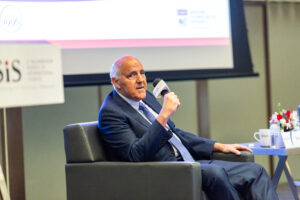Abstract
In recent years, ASEAN’s strategic position has increasingly become a focal point for great power rivalry in the Indo-Pacific region. Contestation over maritime rights and territorial sovereignty in the South China Sea has been further complicated by China and US views on Taiwan and exacerbated by AUKUS and the resurging military alliance of the US and the Philippines under President Marcos. At the same time, ASEAN member states are primarily focused on domestic priorities – elections, economic challenges like the rising cost of living are some examples. Notwithstanding the domestic preoccupations, ASEAN and its member states cannot ignore the growing tensions between the US and China. With the US preparing for the 2024 Presidential Elections, and China dealing with economic uncertainty, the potential for misunderstanding between the two powers is real. It is thus timely to assess the impact of external economic and security pressures on ASEAN and ASEAN Member States to “choose sides”. At the same time, ASEAN divisions have widened over the current civil war in Myanmar and other issues. A perceived lack of progress in Myanmar in particular is damaging its international credibility and has led to criticism and pressure from various quarters. How can and should ASEAN engage in response to such pressures and manage its relations with China and the US as they vie for Indo-Pacific ascendency? The concept of “ASEAN centrality” has long served as a key component for ASEAN’s mode of engagement with external “dialogue partners” but is in need of strategic reconfiguration to manage the shifting tides of Indo-Pacific political dynamics. What can and should ASEAN do to strengthen its position and endure in an era of unprecedented threats to its unity and viability? Is time running out for it?
About the Speaker
David Cohen is the founding director of the Center for Human Rights and International Justice at Stanford University and previously the founding director of the War Crimes Studies Center at UC Berkeley, where he taught for more than 30 years before moving to Stanford as the WSD Handa Professor in Human Rights and International Justice, Professor of Classics, and Professor in Environmental and Behavioral Sciences. Over the past 2 decades Cohen has designed and led trial monitoring, rule of law, judicial training, legal education, transitional justice and human rights projects and programs in Indonesia, East Timor, Sierra Leone, Ethiopia, Bangladesh, Bosnia, Kosovo, Rwanda, India, Philippines, Singapore, and Cambodia. In the last 15 years his work has focused primarily on Southeast Asia, both at the national and ASEAN levels. Together with the Indonesian Institute for an Independent Judiciary he co-directs ongoing research projects and judicial training programs on the rule of law, human rights, and international criminal law with the Supreme Court, the Attorney General’s Office, the National Human Rights Commission, and other agencies in Indonesia. In Cambodia he has led community outreach, trial monitoring, and judicial training projects with the Khmer Rouge Tribunal (ECCC) since 2006. He has also engaged with the ASEAN Intergovernmental Human Rights Commission and other ASEAN bodies on human trafficking, modern day slavery, rule of law, and related issues. He currently assists the ASEAN Council of Supreme Court Chief Justices (CACJ) in developing ASEAN judicial training programs. He has published books, articles and reports on a wide range of legal history, human rights, international criminal law, and transitional justice



 Add to Google calendar
Add to Google calendar
 Add to Outlook calendar
Add to Outlook calendar


